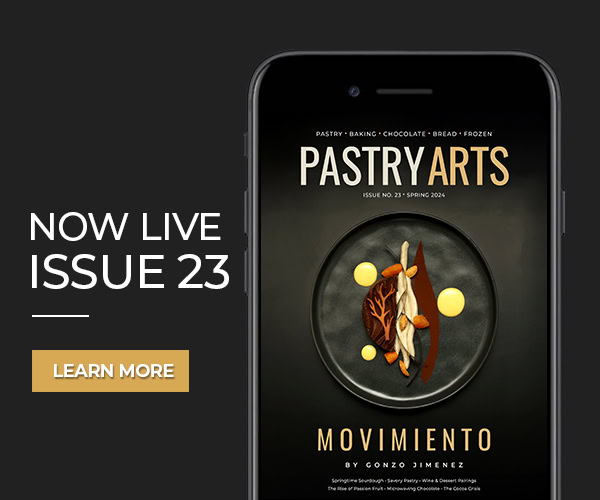Philip Khoury is a pastry chef who is changing the way we think about desserts. He is known for his innovative and delicious plant-based creations, which are inspired by his Lebanese heritage and his passion for sustainability. Khoury’s path to pastry artistry was a winding journey. He began his career as a communications designer, but after a religious experience eating a pastry in Paris, he decided to switch gears. He trained at some of the most prestigious establishments in the world, including Quay, Adriano Zumbo, and Harrods.
In recent years, Khoury has turned his focus to plant-based desserts. He believes that this is the future of pastry, and he is dedicated to creating recipes that are as delicious and indulgent as traditional desserts, but without the environmental impact. Khoury is also passionate about using his platform to promote social justice and sustainability. He is a vocal advocate for animal rights and environmental protection, and he believes that food can be a powerful force for change.
In his upcoming book, A New Way to Bake (Hardi Grant, 2023), Khoury shares his recipes and techniques for creating plant-based desserts that are both delicious and sustainable. He also shares his insights on the future of pastry and the role that food can play in creating a better world. In the following interview, Khoury shares more about his journey to becoming a pastry chef, his passion for plant-based desserts, and his vision for the future of the industry.
The Q&A
What initially ignited your passion for pastry?
I was a young person on a pilgrimage to Paris — the spiritual homeland of patisserie. I was sitting on a park bench around the corner from Pierre Hermé’s Saint-Sulpice store, having a religious experience eating his 2000 Feuilles. In that moment I felt a calling to pastry, even though I was completing my communication design degree. When I got back to Australia, I started training as a pastry chef.
At what point did you begin to gravitate towards plant-based desserts, and what motivated this shift?
I had always been lucky to work in really nice places with incredible ingredients, produced with high welfare, but this was not the norm. The closer I got to seeing how food is made and understanding the immense volume – and seeing how eggs and dairy are produced and how intensive it is – I knew we needed more options. When you realize the industrial scale of food production, it’s not these really nice places that are concerning, but the rest of it. It made me question everything. Also realizing that there were very minimal standards for high-quality plant-based options, I started experimenting, because it was a huge professional challenge.
What technical hurdles did you encounter when you started focusing on plant-based desserts?
My specific focus is in using basic ingredients that are globally available and naturally plant based. I believe that some of our most prized naturally plant based ingredients have immense functionality that have been overlooked. The process was not linear, and I had to keep revisiting recipes with innovations that revealed themselves along the way. So many existing recipes rely on substitution of what I would consider standardized, high-quality ingredients with inferior manufactured substitutes. For my approach, I needed to find new ways for high-quality, naturally plant-based ingredients to shine in new formulas.
How do you strike a balance between creating sustainable plant-based desserts and ensuring they’re as indulgent as traditional ones?
We have an incredible history and heritage of incredible work that’s been done in traditional pastry. We know how important textures are in releasing flavor. Yes, there are some differences between traditional pastry and plant-based options, but they can also be better, cleaner and more interesting. I think it’s such a new area, a lot of knowledge was previously lacking.
I believe that some of our most prized naturally plant based ingredients have immense functionality that have been overlooked.
Throughout your professional journey, how have stints at renowned establishments like Quay, Adriano Zumbo, and Harrods shaped your pastry-making approach?
I’ve been lucky to have secured some amazing experiences that have been looked to for leadership in innovation, execution and experience. I’ve learned that you need to make something incredible not just to tick boxes, but to explore passion and creativity. Customers can see that. The best creations aren’t always briefed in, but come from a very meaningful place of creative exploration which has a beautiful power to inspire that resonates with people.
Are there one or two pivotal lessons you learned working at those places that you believe others could incorporate into their own careers?
I’ve always viewed my career through a longer-term lens. I was so hungry to learn that I did not care about money. I sacrificed a lot, including key family moments, a social life. I never chased a high salary, otherwise I might have not taken some amazing opportunities that one after another unlocked bigger and brighter opportunities. The perfect product brief doesn’t exist. When being creative, just try! Don’t be afraid of your first attempt not being amazing. It rarely is. Also, the value of teamwork is incredible. Having trusted people and partners on your team that give honest feedback to push your work to the next level. I also hate rushing the process for the sake of ticking a box. It should be done right and push a conceptual boundary. Sadly, that’s more and more difficult with the workplace or social media demanding a high volume of output.
Which fundamental principles guide you to ensure that your desserts consistently deliver on taste, texture, and artistry?
Concept and artistry make you pick a dessert, and taste and flavor is explored through texture. They work in tandem to create a wonderful experience.
Your soon-to-be-released book, A New Way to Bake, promises to offer fresh perspectives on cakes and desserts. Could you provide a glimpse into some of the standout techniques or ingredients you’ve featured?
Lots of reimagined classics! Techniques and formulations that allow some of our most prized ingredients shine in exciting ways. Think beautiful madeleines, flaky olive oil pastry, whipped cream, chocolate chantilly mousse, ‘vrioche’ (an olive oil and sweet potato brioche) and lots of classic bakes like chocolate chip cookies, all made with simple recipes and accessible, high-quality ingredients.
How do you envision your book inspiring or empowering its readers?
I hope it becomes a reference that arms professionals and home bakers alike with an expanded repertoire and an outlook. Familiar ingredients, lots of new recipes for many classics. Every recipe contains a tutorial video which I painstakingly recorded in my kitchen and which I wanted to share without limitations, so people see a recipe and feel totally reassured that the results are within reach, whatever their level of experience.
Is there a recipe from the book that holds special significance for you, and can you share the story behind its importance?
Maamoul is a traditional Middle-Eastern filled biscuit (dates, walnut or pistachio). My heritage is Lebanese, and as a kid I always thought they were a traditional Easter bake. As I got older, I found out they are enjoyed by Christians at Easter, Muslims at Eid and Jews at Purim. I think this shows the power of food to unite us. We need to focus on the humanity that we share in common rather than the little things that divide us.
Concept and artistry make you pick a dessert, and taste and flavor is explored through texture. They work in tandem to create a wonderful experience.
Could you shed light on the underlying message of your book’s title, A New Way to Bake, and what you hope it communicates to your audience?
The title is a statement, but I never want to force my views on people. Readers can make their own minds up. It’s not the best way, not the only way, it’s more new ways. I’m all about new horizons and optimism. All the ingredients will be familiar, but many recipes and techniques will be totally new, so in many ways it’s a new way to bake (naturally plant-based).
From your perspective, how might the entire culinary industry evolve towards sustainable and plant-based methods without sacrificing taste and quality?
We need to look back at all our wonderful roots. Our grandparents and great grandparents ate very differently and likely for good reasons. There’s an immense amount of heritage at risk of being lost due to globalization that holds the secrets to how we will survive into the future as climate starts to heavily affect all types of agriculture (I recommend reading Eating to Extinction by Dan Saladino, which has an underlying message of hope). We need to shift our focus from so many animal-based products to more plants.
My specific focus is in using basic ingredients that are globally available and naturally plant based.
What legacy or influence do you hope your work will imprint on the realm of pastry artistry and broader perceptions of desserts?
We are really on the edge of some exciting innovation within our industry. It’s just the very beginning and so many doors will open to new and beautiful experiences. I hope we can be guided by the past and look into the future with compassion and open-mindedness. I hope people get to explore and enjoy delicious bakes without compromise.
I’ve learned that you need to make something incredible not just to tick boxes, but to explore passion and creativity.
Photos by Matt Russell
(This article appeared in the Fall 2023 issue of Pastry Arts Magazine)













You must be logged in to post a comment.